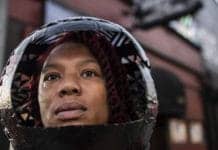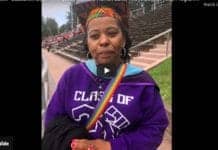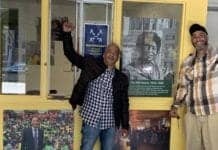
Mayor London Breed and Supervisor Shamann Walton release roadmap to guide transformative change and investments in African-American community
San Francisco – A report from the Human Rights Commission with initial recommendations from the African-American community on reinvesting in the city’s African-American community was released July 27 by Mayor London Breed and Supervisor Shamann Walton. In June, they had announced their intention to redirect funding from the police department into the African-American community following the killing of George Floyd. A key part of this process involved hearing directly from community members, particularly those most impacted by systemic racism, through a process facilitated by the San Francisco Human Rights Commission (HRC).
The amount of funding being reinvested is detailed as part of her proposed budget, which must be submitted by August 1st. In addition to investing in new programs, the Mayor has also prioritized maintaining and enhancing African-American serving organizations, despite the needs for broader cuts in this year’s budget to address the $1.5 billion deficit.
The report released today summarizes the findings of this initial community engagement and provides a framework for ongoing conversations and decisions to reinvest in San Francisco’s Black community. The report highlights recommendations, research and data raised through the community input process to prioritize resources to the Black community.
Key issues raised by the community include the areas of mental health, homelessness, education, youth development, economic justice and more. The report also includes findings about significant concerns over the need for better systems accountability from the city to engage with and deliver services to the public. The report has served as a guiding document about where and how city funding should be reinvested in the upcoming budget for Fiscal Years 2020-21 and 2021-22, as well as longer-term policy changes and budget investments.
“If we truly believe that Black Lives Matter, then we need to listen to Black voices, not tell Black people in this city and this country what is best for them. That includes listening to those who have long lost faith in City Hall to actually deliver on promises that are so often made, but not kept,” said Mayor Breed.
“While protests have happened all over the world to support the movement to change the racist systems that have long plagued our country, it is time to do the hard work now and into the future. Over the past month we initiated a process to hear directly from residents so we can begin the move for real, tangible changes in addressing the systemic issues facing our community. This is only the first step in a long process to bring resources and accountability to our community that has for decades been underserved, underrepresented and ignored.”
“The only way to address some of the systemic issues that have negatively affected Black people and have existed for decades in our city is to make a sizable investment in the Black community that will lead to real change,” said Supervisor Shamann Walton. “Having Black voices take the lead on the process for reinvestment in our community is key to developing strategies that lead to tangible outcomes.

“I’m excited to share what the Black community has identified as priorities, so that we as policy makers can make the resources available to achieve tangible results. With reparations, the redirection of SFPD resources and community truly taking the lead, this is only the beginning.”
“Our community engagement process captured a spectrum of participant sentiment, from disheartened community members who have gone through this before, only to be let down, to those with renewed hope that the historic moment we are living in will bring real change,” said HRC Director Sheryl Davis. “Racial equity becomes real when we appropriately meet community needs and racism no longer determines outcomes for our residents. It’s clear that Black people want and deserve better public service from their city and we have been falling short.”
The amount of funding being reinvested is detailed as part of her proposed budget, which must be submitted by August 1st. In addition to investing in new programs, the Mayor has also prioritized maintaining and enhancing African-American serving organizations, despite the needs for broader cuts in this year’s budget to address the $1.5 billion deficit.
Investing in San Francisco’s African American community is necessary to repair the legacy of systemic racism and resolving the disparate outcomes in economic opportunity, housing and health indicators for Black people in the city. African Americans in San Francisco experience significant structural inequalities that need to be addressed and remedied.
- African Americans have the lowest median household income in San Francisco; the average income for a Black household is $31,000, as compared with $116,000 for white households.
- Black people have the highest mortality rate for nine of the top 10 causes of death in San Francisco. African Americans have the lowest rate of homeownership in San Francisco, at 31 percent.
- Black and African American individuals comprise 37 percent of the city’s unhoused population, despite making up less than 6 percent of the city’s population as a whole.
- About 45 percent of all San Francisco Police Department use-of-force cases involved Black people in 2019.
In order to make lasting, structural change in the city’s policies and budget investments, community engagement must be ongoing and sustainable. The Human Rights Commission documented emailed comments, hosted online meetings, and created a short survey for initial thoughts and feedback. More than 600 people participated in some capacity in the process. The report includes a recommended timeline for ongoing community engagement.
Redirecting funding to the African American community and prioritizing equity
The Mayor’s proposed budget, relying on the Human Rights Commission’s report of Black community priorities, acknowledges the structural inequities impacting the city’s African American community, resulting from generations of disinvestment. The proposed budget reinvests $120 million in funds over two years, predominately from the city’s law enforcement departments, towards efforts to repair the legacy of racially disparate policies on health, housing, and economic outcomes for African Americans.
The proposed budget also includes $15 million in one-time funding for the San Francisco Unified School District to support San Francisco’s public school students most disparately impacted by COVID-19 and the resulting school closures. The budget further includes additional General Fund investments in programs for San Francisco youth.
Mayor Breed’s budget is informed by the Human Rights Commission’s community information gathering process and recognizes that the African American community must continue to be involved in determining the specific allocations of the funding. Therefore, the Human Rights Commission will continue leading a community process to determine how the $120 million will be allocated. Based on the initial input from the community, Mayor Breed has proposed that 60 percent of the funding be directed for mental health, wellness and homelessness, and 35 percent be directed to education, youth development and economic opportunity. The disbursement of funds will be discussed, tracked and evaluated on an ongoing basis through the Human Rights Commissions’ continuing process of community engagement.
The remainder of the redirected law enforcement funds in the mayor’s proposed budget will be allocated for a thorough planning process in FY 2020-21 to divert non-emergency, low priority calls for service away from the Police Department to non-law enforcement agencies.
The mayor’s proposed budget also invests a total of $12.5 million to extend stipend programs for SFUSD teachers in high turnover schools and for educators in the city’s early care and education system. Mayor Breed’s budget adds $5.5 million over the two years to extend the Opportunities for All (OFA) pilot, a youth internship program initiated in last year’s budget. Lastly, the Mayor’s proposed budget allocates another $4 million over two years to be distributed by the Office of Racial Equity within the Human Rights Commission to maintain and prioritize ongoing community involvement and responsive programming.
Next steps
The Human Rights Commission will host two community meetings to gather additional feedback and recommendations to add to the report. In September, the HRC will launch monthly community meetings to review progress on recommendations and build out implementation plans with legislators through a working group. In October, the HRC will launch quarterly meetings to share updates with the public on the report.
For more information, email mayorspressoffice@sfgov.org. Bay View staff contributed to this report.

 Store
Store












